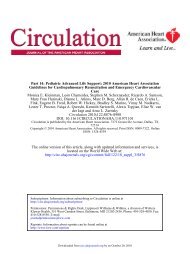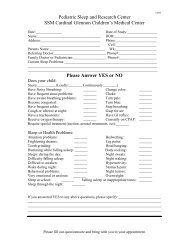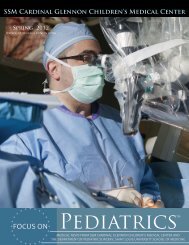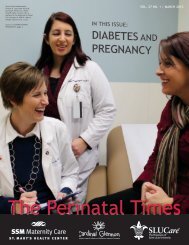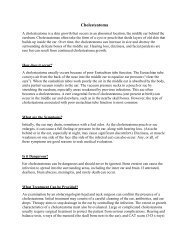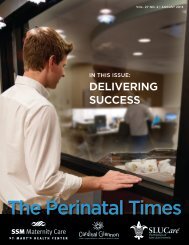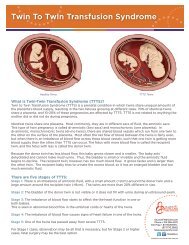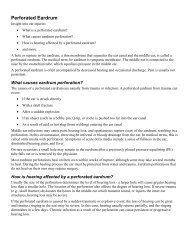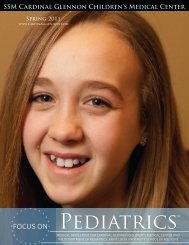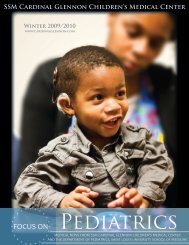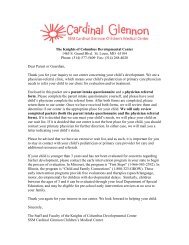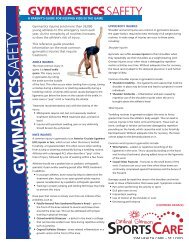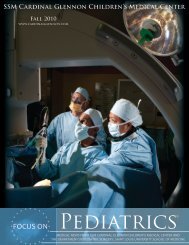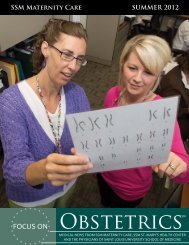QIPS Program - SSM Cardinal Glennon Children's Medical Center
QIPS Program - SSM Cardinal Glennon Children's Medical Center
QIPS Program - SSM Cardinal Glennon Children's Medical Center
You also want an ePaper? Increase the reach of your titles
YUMPU automatically turns print PDFs into web optimized ePapers that Google loves.
Why Simulation<br />
Simulation is an advanced modality for<br />
observing group dynamics and building a more<br />
effective team.<br />
A wider breadth of medical crisis scenarios can<br />
be recreated using a high fidelity simulation<br />
mannequin in a safe, flexible, and realistic<br />
teaching environment.<br />
The outcomes of this learning and teaching<br />
method far surpass those of textbook, lecture,<br />
and computer based learning.<br />
Benefits<br />
Until recently, teamwork and crisis<br />
management have been difficult concepts to<br />
teach and evaluate in a quantifiable manner.<br />
Optimal patient outcomes, however, have<br />
always depended on a team’s knowledge,<br />
efficiency, and ability to work together.<br />
Through simulation, a health care team can<br />
learn the physiologic components of crisis<br />
management. They can also improve technical<br />
skills, equipment knowledge, and develop<br />
the leadership and teamwork needed to<br />
successfully deliver exceptional health care.<br />
Obstetrics is a high risk specialty, in which<br />
emergencies are, to some extent, inevitable.<br />
Training staff to manage these emergencies is<br />
a fundamental principal of risk management.<br />
Traditional risk management strategies based<br />
on incident reporting and event analysis<br />
are reactive and not always effective.<br />
Simulation-based training is an appropriate<br />
proactive approach to reducing the errors<br />
and risks inherent in obstetrics. Teamwork<br />
and communication will also improve<br />
while simultaneously giving the students a<br />
multiplicity of transferable skills to advance<br />
their personal performance.<br />
Q.I.P.S. <strong>Program</strong><br />
The Quality Improvement through Perinatal<br />
Simulation team is comprised of experienced<br />
neonatal and maternal educators as well as<br />
the <strong>Medical</strong> Director of <strong>SSM</strong> Maternal Services.<br />
The Q.I.P.S. Team will put health care<br />
providers through emergency situations in real<br />
time using the NOELLE TM Birthing Simulator<br />
and the Newborn HAL ® Team Trainer. These<br />
state-of-the-art simulators are fully responsive<br />
with life-like behaviors and reactions. Some of<br />
the high risk scenarios that can be presented<br />
include shoulder dystocia, hemorrhage, breech<br />
delivery, and emergency cesarean section.<br />
Simulation training enhances team dynamics,<br />
builds confidence and enhances skills in a riskfree<br />
environment. Multi-disciplinary simulation<br />
training allows health care providers to acquire<br />
cognitive, technical and behavioral skills to<br />
manage crises, avoid adverse events and<br />
ultimately improve patient outcomes.<br />
Teams that work together<br />
can greatly improve outcomes<br />
over groups that are simply<br />
together working.



